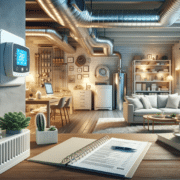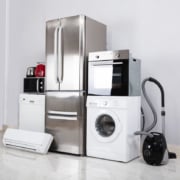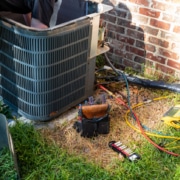Carbon Monoxide Safety and Your HVAC System in Winter
It’s January in Michigan. We are in the coldest part of the year – which means your furnace is working its hardest to keep you and your family warm and cozy around the clock. A properly functioning heating system puts out a lot of heat, but it does so safely, without producing toxins that could cause harm. In this blog we will talk about the risk of carbon monoxide poisoning from improperly maintained HVAC systems so that you will know what you need to do to prevent or detect it in your home.
Carbon Monoxide Gas, the Invisible Killer
What is carbon monoxide? CO is a colorless, odorless gas that is produced as a byproduct when fuels like gas, oil, kerosene, wood, or charcoal are burned. In large enough amounts, carbon monoxide can be deadly to inhale.
How can this happen? Primarily if your furnace does not burn its fuel completely, although furnaces are not the only source of CO. Other household appliances, like boilers, gas stoves, fireplaces, and water heaters, can also produce carbon monoxide gas and become dangerous if your home is inadequately ventilated.
While you can’t see or smell carbon monoxide, there are early warning signs of CO poisoning, including headaches, dizziness, weakness, nausea, and confusion. If a person inhales enough CO gas, he can experience severe health issues, including unconsciousness and death. This is because carbon monoxide interferes with the body’s ability to absorb oxygen – something we all need – leading to serious tissue damage.
Detecting Carbon Monoxide in Your Home
CO cannot be detected without the use of special equipment. You should install carbon monoxide detectors on every level of your home, especially near bedrooms. They will alert you if CO levels rise. Like your smoke alarms, you should test these detectors regularly and replace their batteries as needed. A CO detector has a typical lifespan of between 5 and 7 years, so if yours are older than that, get new ones.
How to Prevent Carbon Monoxide Buildup
There are a number of things you can do to prevent the danger of carbon monoxide buildup in your home. These include:
Regular HVAC Maintenance – The first line of defense against CO poisoning is scheduled HVAC maintenance. These periodic checkups ensure your HVAC system and any other appliances that burn fuel are inspected and serviced annually by a qualified technician. HVAC professionals are trained to identify potential hazards, like a cracked heat exchanger or blocked chimney, that could lead to CO buildup.
Proper Ventilation – CO is not dangerous in very small amounts, which is why proper ventilation is crucial. Never use a gas oven to heat your home if your furnace isn’t working or burn anything in a stove or fireplace that isn’t vented. Do not use portable fuel-burning camping equipment or generators indoors either. Carbon monoxide poisoning is also possible if you run your car or truck inside a closed garage. Any vents, including your dryer vents should always be kept clear of snow and other debris.
Education – Educate your family or anyone living in your home about the dangers of CO poisoning. Teach them the symptoms to look for and the importance of evacuating the house and calling 911 if a CO alarm goes off. Immediate treatment is critical to a good outcome if CO poisoning occurs. The person should be moved to fresh air, and medical attention should be contacted.
Safety First!
There are many enjoyable things about the winter season, but it’s also important to stay warm and stay safe. Regular maintenance of your HVAC system, proper use of appliances and carbon monoxide detectors, and awareness about carbon monoxide can make all the difference.
If you have any concerns or questions about carbon monoxide or how well your furnace and other gas-fueled appliances are working, please call us at (989) 354-5427. We will be happy to schedule someone to take a look at your HVAC system and make recommendations for its maintenance and most efficient use. Contact us today!











